If you’re considering introducing a new puppy to full-time van life, there’s a lot to think about and consider before making the decision.
Anyone who has raised a puppy knows that it comes with its challenges, so how is it to get one when living in a van?
We traveled for a year and a half full-time in a van with our dog, Ayla until she passed. And two months later, when volunteering at the ADANA dog shelter, we fell in love with a tiny little puppy.
Obviously, we ended up adopting him. Our new little adventurer and van life puppy Atlas is everything a puppy should be.
He’s curious, fun, and brave, yet scared of the weirdest things, super cute of course, and… biting everything that comes in his way! Thus he’s adopted the nickname Baby Shark. (Please tell me you know the utterly annoying Baby Shark song from the kids’ YouTube video!)
Match this with a small living space, a non-build van where we basically sleep on a mattress on the floor and cook on a gas cooker half a meter above the floor.
He reaches everything at all times!
At the same time, we spend most of our time outside, so he definitely gets socialized and introduced to different places, things, and settings.
There are so many pros and cons of raising a puppy in the van. I’ll share our experiences in this post so that you know what to expect if you choose to do so too.

Hi, I’m Linn Haglund, the face behind Brainy Backpackers. I’ve been based in Spain for the last 10+ years, and travel locally and abroad whenever I have a chance. I’m passionate about responsible travel, slow and off the beaten path travel, and outdoor activities, especially hiking. I’m currently slow traveling in my van Persistence (Persi among friends) with my fiancée Mohammed and rescue puppy Atlas. I’m excited to help you explore this planet responsibly!
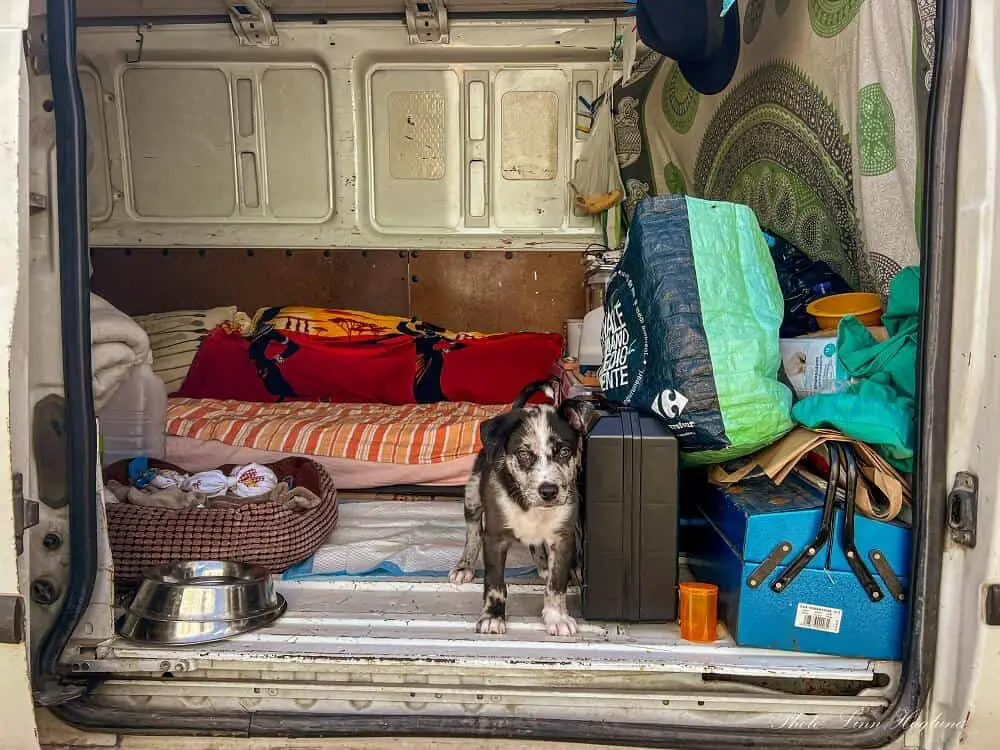
Disclosure: This post may contain affiliate links. That means that if you make a purchase through one of those links, I will get a small commission at no extra cost to you.
MORE VAN LIFE POSTS
- Is van life worth it?
- How to start van life without money
- Best van life accessories
- How to make money living in a van
- Vanlife in Spain
Pros of raising a puppy in a van
Let’s start with the pros of raising a van life puppy. Because there are so many reasons why you should embrace bringing a puppy into your full-time van life adventure.
You can be with your puppy all the time
This might just be the most positive thing of them all! The fact that you’re traveling full-time and likely working from your van means that you can be with your puppy all the time.
There are so many advantages to this.
First of all, you can take it out to potty whenever it needs it so potty training goes so much faster (I’ll get back to that later.)
Secondly, you can monitor its biting – meaning less chewed-up stuff! Trust me, Ayla as a puppy would chew on tables, sofas, book stands, you name it! Mostly when I was at work. With Atlas, it’s easier, because we’re there the whole time and can stop it before it starts.
You can also monitor the puppy’s sleep better. Puppies need a lot of sleep and if they don’t get their beauty sleep, they turn into little T-Rex babies, crocodiles, wolves, you name it.
Super bitey, naughty, barking little creatures – still annoyingly cute, though, but it’s a sign they need a nap. Being there, you can put the little fur baby in its crate to get some rest.
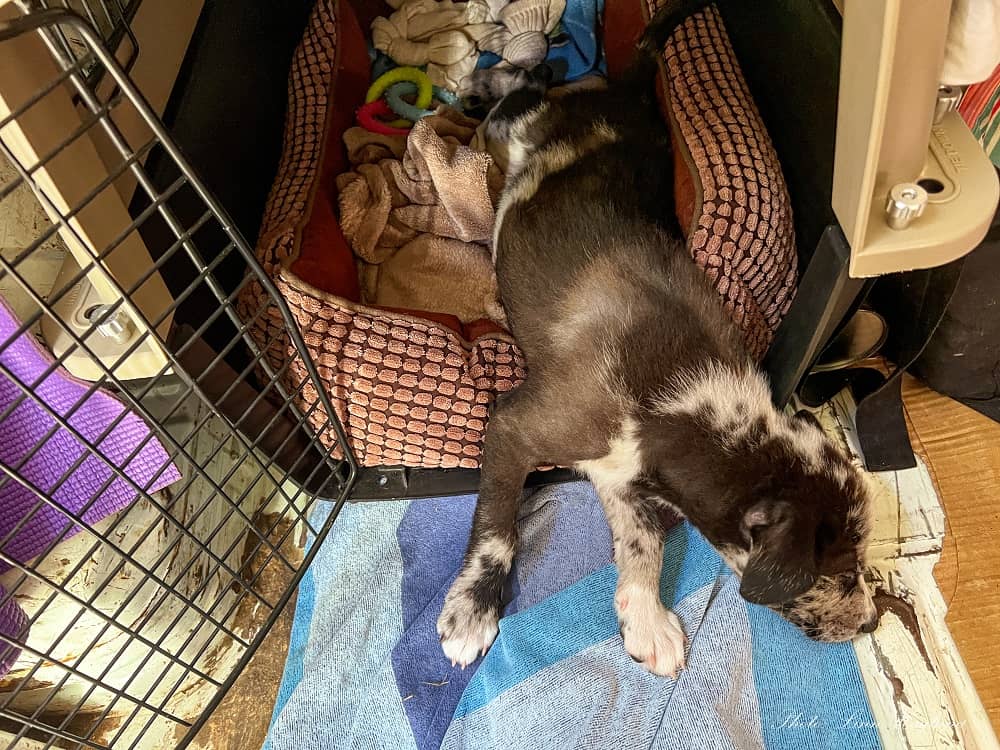
Constant changing environments
One of the best things about training your puppy when traveling in a van is that it will be exposed to constantly changing environments.
This is so important in the beginning of the dog’s life so that they get used to different people, things, and situations early. The longer you wait with socialization, the harder it is for the dog to adapt to new situations.
For us, it was easy to pick up the things Baby Atlas was afraid of early so that we could expose him to them often with positive associations (for him: TREATS!)
For anyone being worried that the puppy needs stability and not so much change, Atlas’ stability is Mohammed and me, it’s also his crate and Persi (the van.) He feels safe there. That’s home for him and he is relaxed in the crate, in his van, with his mommy and daddy.
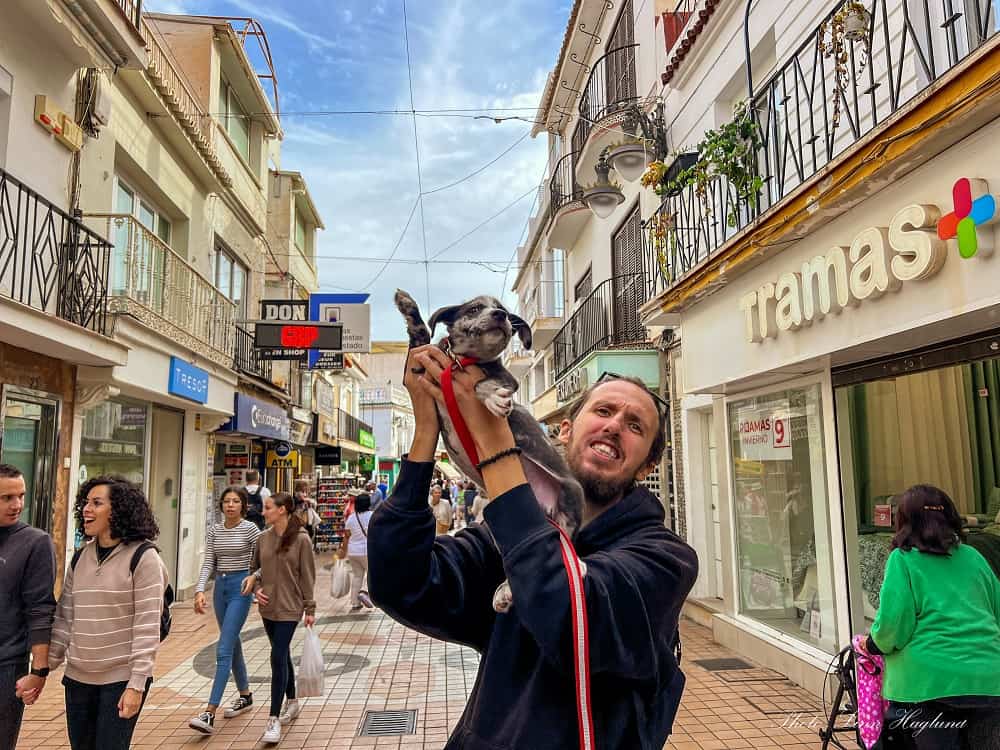
It’s easy to go out for potty
When you’re still potty training the puppy, there are some rules to follow. Take the puppy out after sleep, eat, and play. When you live in a van, it’s super easy to take the puppy out often.
You basically just open the door and step outside.
We had him a few days at my friend’s house on the second floor with no elevator. That was a pain in the butt.
We’ve also been house-sitting with him on the 10th floor (with an elevator – I’ll get back to that later) and that was even more challenging with several accidents in the elevator and the hallway.
So far, my favorite place to potty train has been the van!
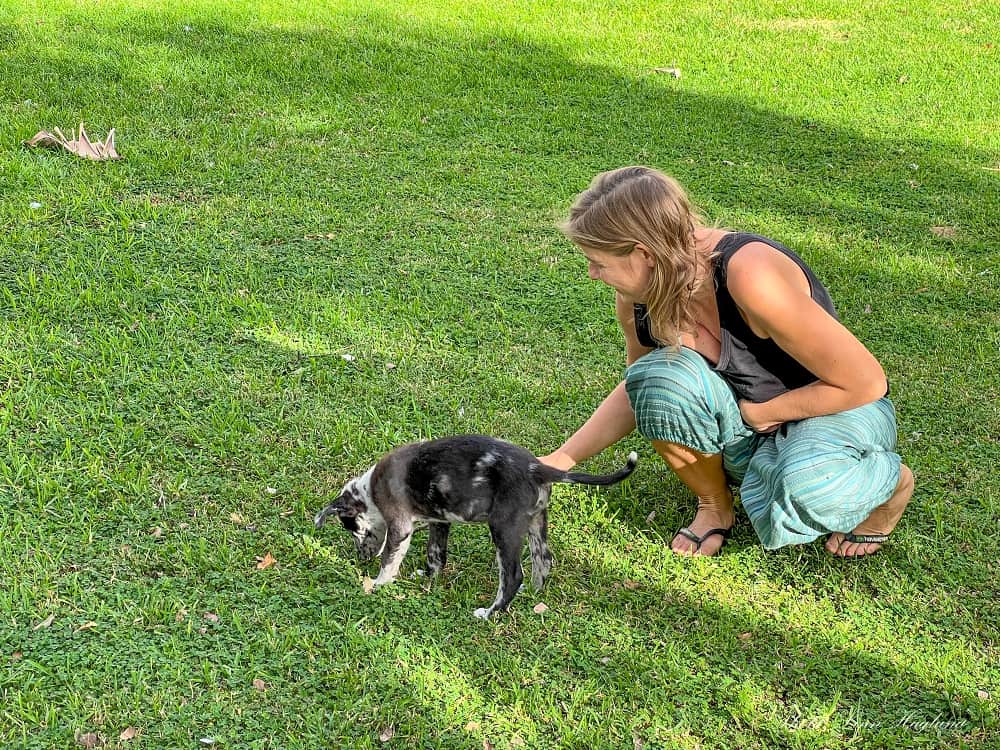
Crate training
Crate training comes naturally when raising a puppy in the van. In a lot of countries, it’s mandatory to keep your pet in a crate or a dog-friendly seat belt when driving.
Spain is one of those countries and for us, it’s not only important to keep Atlas in the crate when driving, but also when we’re cooking or leaving him by himself for a bit (Yes! It’s super important to train separation with your puppy even if you spend all your time together.)
A puppy that feels safe in his crate will be so much easier to deal with in different situations when you travel with the dog.
You know, you might decide a couple of years ahead to stop living in the van and prefer to fly or travel by train and it will make it so much easier if your puppy already is comfortable in the crate.
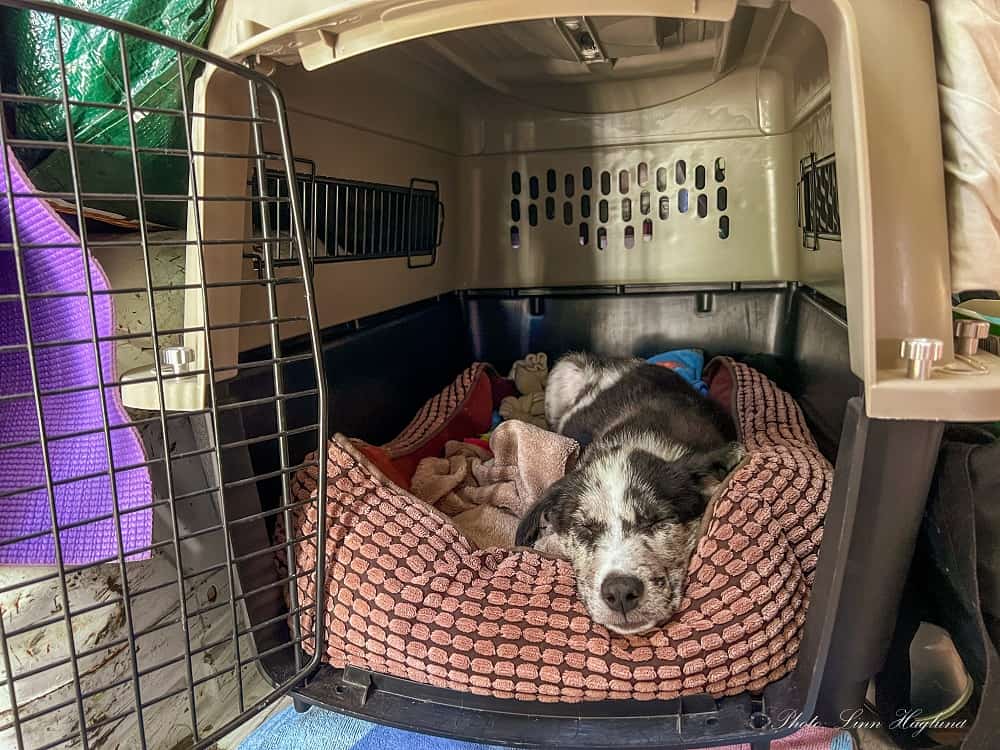
Cons of raising a puppy in a van
Now that we’ve looked at the pros of getting a van-life puppy, it’s only fair to have a look at the challenges. Because there are definitely challenges and you better be prepared than regret it afterwards.
Tight space before vaccination
Okay, so this was our biggest challenge when getting Atlas. He couldn’t go out for the 10 first days before he got his puppy vaccination.
I’m usually not too worried, but with Atlas being a rescue puppy that still was fed puppy milk when we adopted him, I didn’t want to risk it. He was so tiny and skinny when he came to the shelter, so we decided to follow the vet’s orders 100%.
Having a peeing pad on the only free “floor space” we have in our van and his puppy bed next to it became extremely cramped.
Hopefully, you’ll have a more organized van with more floor space – I know that our situation is less than normal. Yet, it’s good to be prepared for it in the first week or so if your puppy isn’t finished vaccinated.
Once he started to be more confident, it also got extremely tight for him since we couldn’t take him out to explore new surroundings.
In this situation, you just gotta remember that it’ll pass soon.
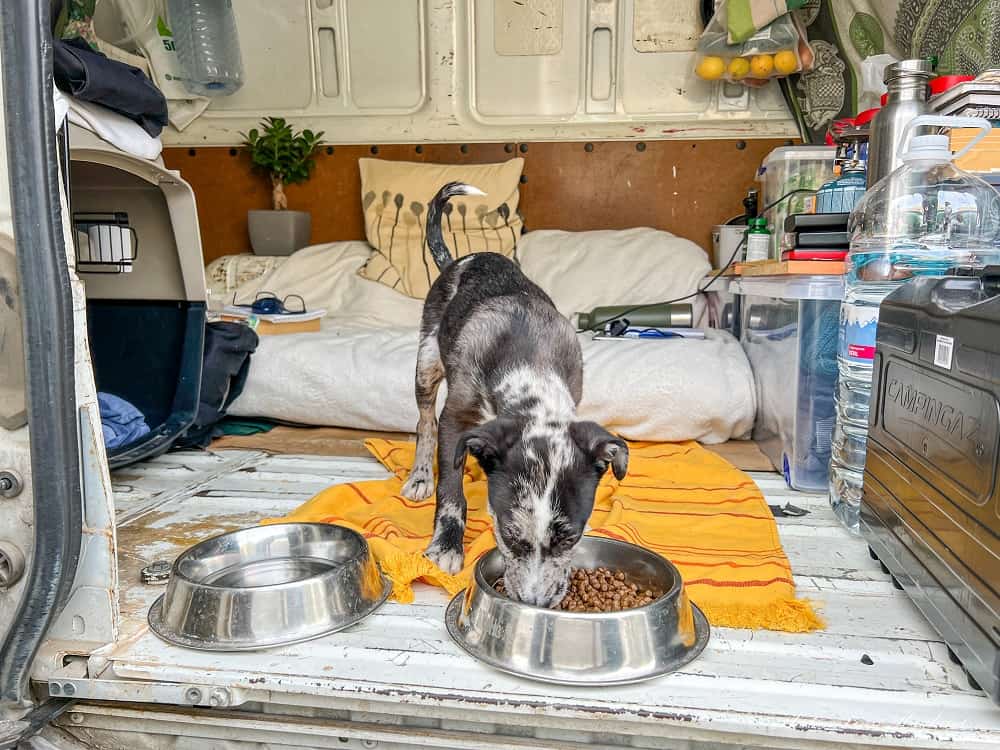
Socialization around normal “home situations” is hard
As I mentioned above, we’ve been house-sitting for 3 months with Atlas because Persi (the van) had electrical issues and wasn’t road-worthy for a while.
This was surprisingly good for us and for training Baby Altas. We found out he was shit scared of elevators. It took 2 days before we could take him into the elevator without having his nails pierced into our skin as he was clambering onto us shaking.
We also learned that he was scared of heights and walking the hallway on the 10th floor was a challenge without him lying flat on the ground not wanting to move. Yes, he does that when he’s scared.
We also learned that he’s shit scared of getting on and off the train. Same scenario – lying flat, until he’s picked up and pierces his nails into our skin.
That’s not really getting better, we’ve been on the train multiple times, and he’s calm once on it. So I guess we’ll have to take the train even after getting on the road again.
With this, I guess what I want to say is that you should try to find situations that you don’t normally expose your puppy to when living in the van.
Other examples of things we got him used to when house-sitting that was scary at first were the vacuum cleaner, the mop, the washing machine, and the dishwasher.
But remember, all puppies are different and some are super tough. And suddenly there is the most random thing that freaks them out. So you don’t really ever know lol
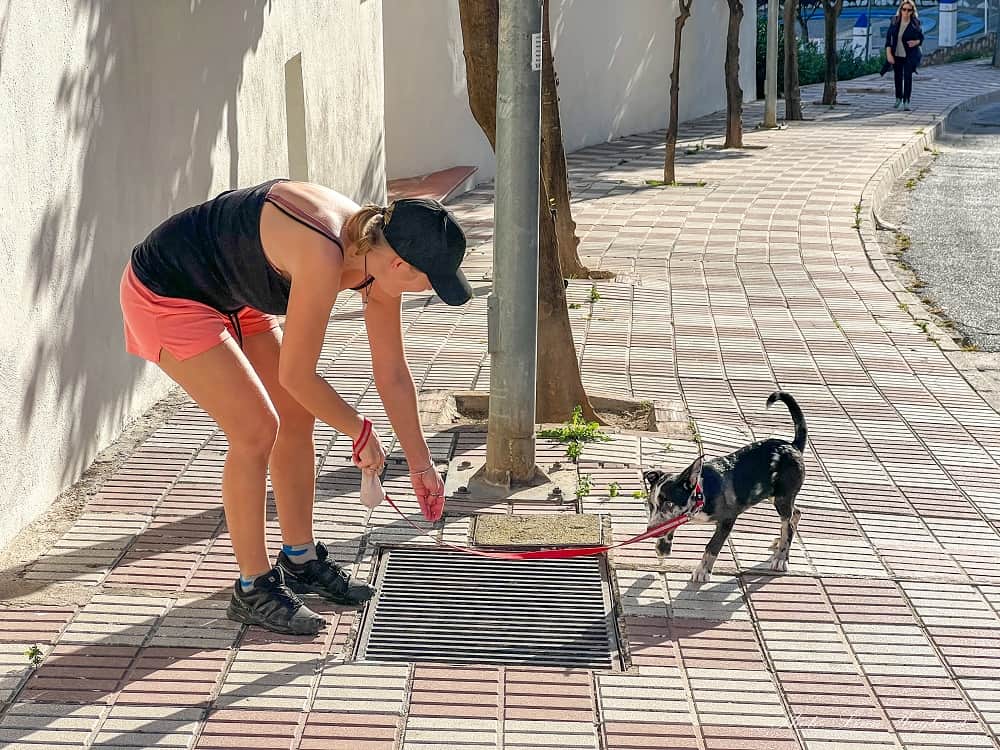
Exercise and play on rainy days
Finally, we have the lovely rainy days. The days you just want to cuddle up in the van and not do anything. But your tiny van-life puppy is full of energy.
The downside of these rainy days is that you don’t really have much floor space to let the puppy play inside. While in a house, you can engage with the puppy and let it run around inside to get rid of some of that puppy energy, in the van, it’s kinda not possible.
You need to find alternative games to let the puppy burn energy. Basically, drain their brain instead.
We’ve used bottles, they make a lot of sound, but he loves chewing on them and it keeps him busy for a while. We also spend a lot of time training different commands that don’t need moving around.
A puppy will quickly get tired when doing this, though 6-month-old Atlas takes a lot longer to drain for energy than what 3-month-old Atlas did.
The most important thing is that you make sure your puppy is tired so it goes to sleep happily before waking up again and recharged with new energy to work away.
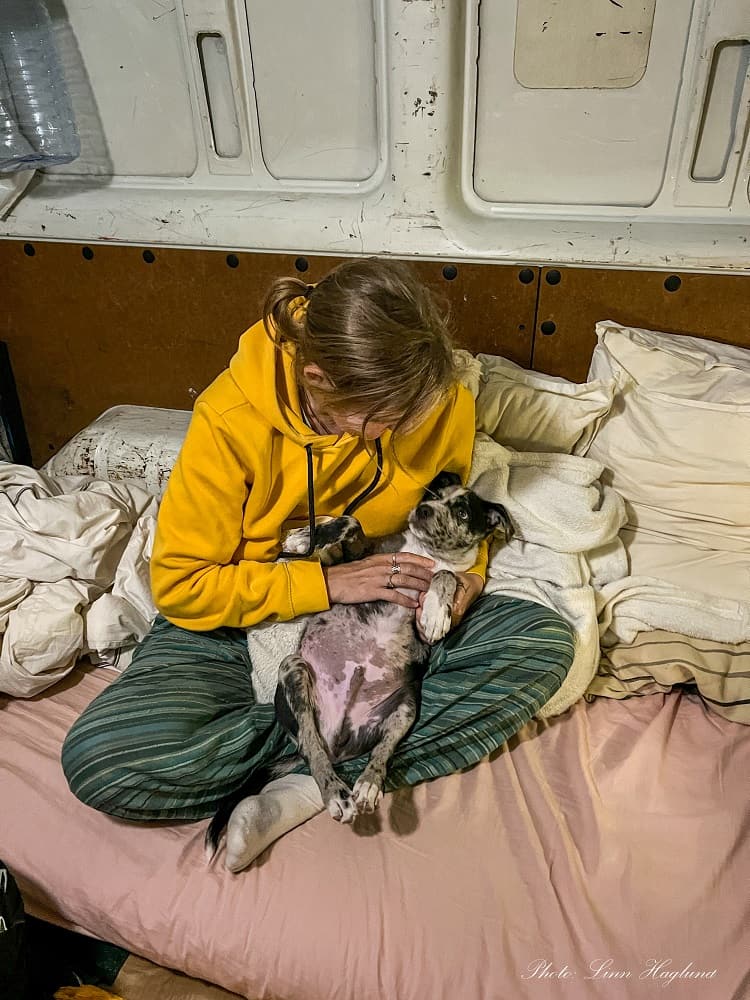
Less space and no personal space
There’s no secret that the space in a van is tiny. For us, even more so because we have everything on the floor. Bed, boxes with all our stuff, and the dog crate. And the dog’s stuff.
It fills up quickly and adding a crate and a dog into your tiny living space will take up a lot more space. Not only the crate but also the water bowl and food bowl (which I recommend doubling with the water bowl to save space when puppy isn’t eating.)
Besides, we all know that puppies usually have no personal space. They want to be on top of you at all times. Goodbye, personal space!
While you will probably put the puppy in the crate a lot, it also needs to roam around and explore the van to get used to the space, and the limits you set for it, and stretch its legs. But you’ll find a balance that works for you soon enough.
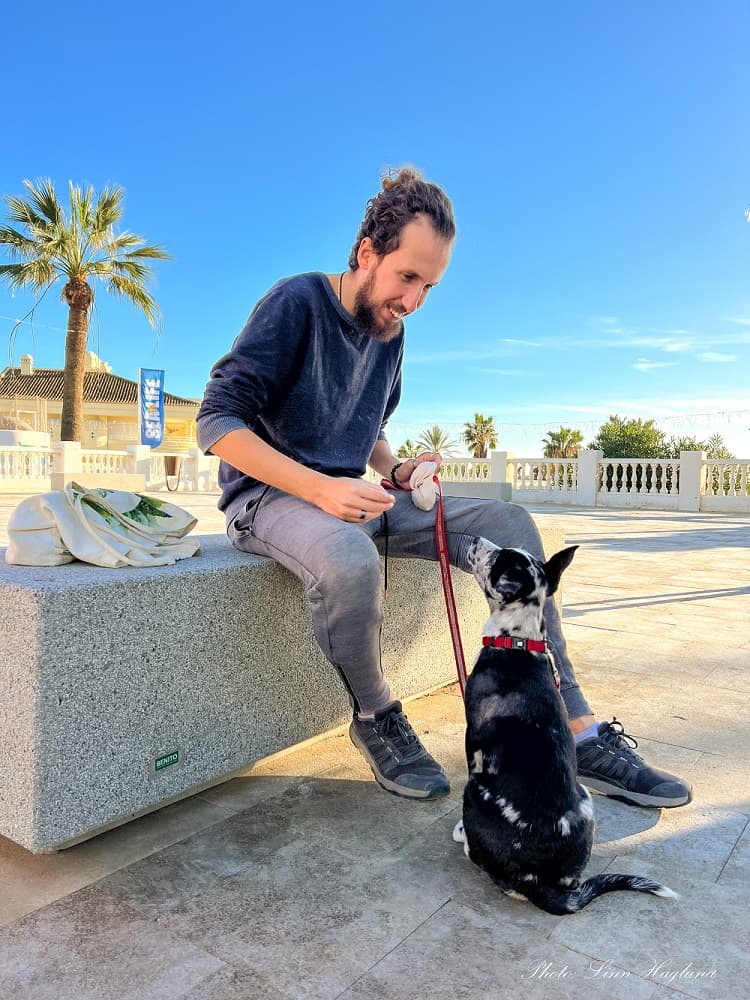
Top tips when living in a van with a puppy
As you can tell, living in a van with a puppy can be challenging. But with some tricks down your sleeve, it can get a lot more fun than stressful. Here are my top tips for surviving van life with a puppy.
- Always have treats on hand
- Train constantly with your puppy
- Focus on commands you will need in everyday life
- Set your boundaries from the first few days (I usually like to let the puppy get to know the space the first few days before starting to set limits)
- Crate train from the beginning
- Take small drives at first to see how the puppy reacts before going on a longer drive (if it’s calm from the beginning, there’s no stress – but some puppies might vomit)
- Start early to leave the puppy alone in the van for small periods to make it get used to separating from you. We started by going out with the rubbish and leaving him alone with the doors closed
- Get a long line (10-15 meters) early to start training recall on open spaces
- Expose your puppy to as many different things as you can early and if it finds anything scary, do it over and over again (with treats) until it’s not scary anymore
- Spend as much time as possible outside so your puppy is tired and sleeps like a baby when you’re in the van
- Be flexible with eating and working times so you can be present with the puppy when it’s awake and you can eat and work when it’s asleep
- Enjoy every moment and make the best out of it! They grow up so quickly!
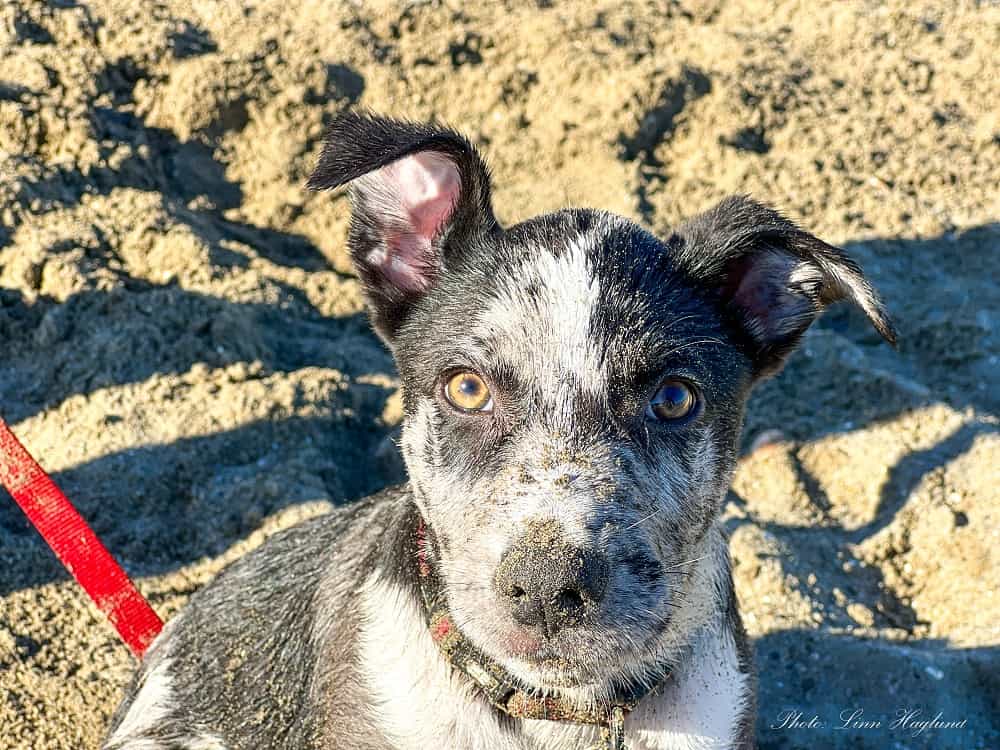
Conclusion: Rasing a van life puppy
Summing up, raising a van life puppy can be challenging, I’m not going to lie. But it’s also super rewarding and I wouldn’t want it any different.
It’s a great way to let your dog grow up with the freedom of being outside and spending time with their humans.
Remember, dogs are pack animals and there’s nothing that makes them happier than hanging out with us exploring this exciting world.
